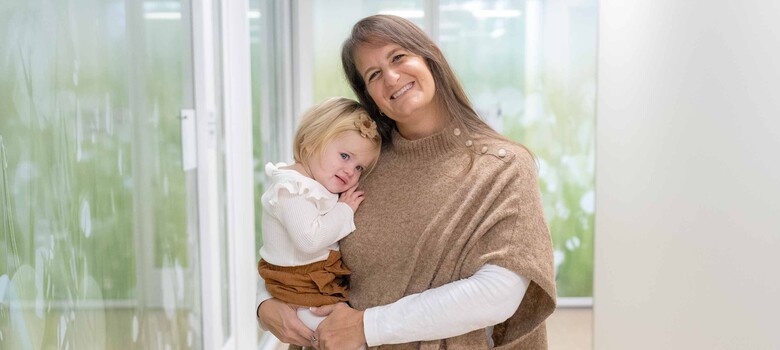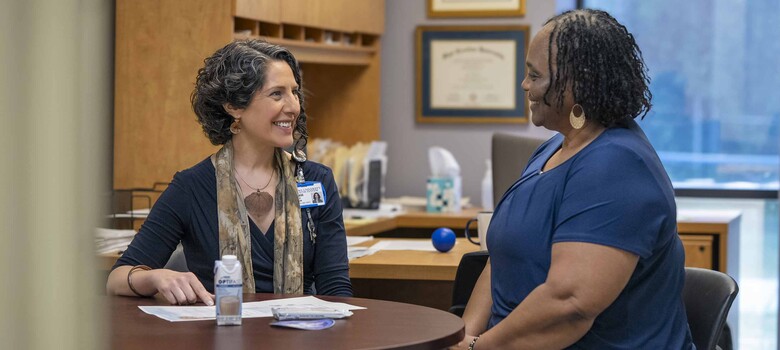5 Steps to Keeping the Aging Voice Healthy

As we get older, our voices can become hoarse and weak. But this doesn’t have to be an inevitable part of aging. Here are a few simple suggestions to help keep your voice healthy and strong for years to come.
Your Voice Matters
Many older adults find it increasingly difficult to communicate, which can lead to social withdrawal and even depression. While most people understand that hearing loss is an important consideration, it's just as critical to evaluate and treat aging voice problems. Also called presbyphonia or presbylaryngeus, these issues can develop due to vocal cord atrophy, diminished lung power, and overall health decline. But Duke Health speech pathologists Caroline Banka and Cristen Paige explain there’s plenty we can do to keep our voices in tiptop shape.
1. Be Aware
 Knowledge is power. Even if you haven’t begun experiencing voice changes, knowing the signs will help you nip them in the bud if they begin. And being proactive can help you keep your voice stronger in the long run.
Knowledge is power. Even if you haven’t begun experiencing voice changes, knowing the signs will help you nip them in the bud if they begin. And being proactive can help you keep your voice stronger in the long run.
“Voice changes in older adults can be gradual and insidious. In this population, voice changes can go unnoticed, and yet they have a very big impact in the long run,” Banka said. “Watch for voice changes including breathiness, hoarseness, increased effort speaking, and feeling short of breath when speaking.”
2. Maintain Your Overall Health
 You may be surprised to learn that things like asthma, allergies, and chronic obstructive pulmonary disorder (COPD) can affect your voice. That’s because they can restrict breathing, which is vital to voice production.
You may be surprised to learn that things like asthma, allergies, and chronic obstructive pulmonary disorder (COPD) can affect your voice. That’s because they can restrict breathing, which is vital to voice production.
“The voice is more than just the vocal folds,” said Banka, referring to what are sometimes called the vocal cords. “The whole vocal system depends on how you’re using your breath.”
Also try to keep the rest of your body in shape. Regular exercise helps increase overall stamina, build muscle tone, and improve posture -- all of which contribute to a healthier voice.
3. Practice Good Vocal Hygiene
 As you can imagine, how you treat your throat and larynx (voice box) affects your voice. The larynx should stay moist and flexible, so drink six to eight glasses of water a day. Limit caffeine and alcohol, which dry out your throat. Incorporate “wet snacks -- things like grapes, melons, cucumbers -- that have a lot of water content,” said Paige. Use a humidifier at home to keep the air moist. And, of course, don’t smoke!
As you can imagine, how you treat your throat and larynx (voice box) affects your voice. The larynx should stay moist and flexible, so drink six to eight glasses of water a day. Limit caffeine and alcohol, which dry out your throat. Incorporate “wet snacks -- things like grapes, melons, cucumbers -- that have a lot of water content,” said Paige. Use a humidifier at home to keep the air moist. And, of course, don’t smoke!
4. Use It or Lose It
 For older adults, if you are retired or living alone, you may be talking less. But just like the rest of the body, the voice needs exercise to keep it in good shape. Join a choir, sing in the shower, or read aloud. Be social and participate in conversation. The worst thing you can do is isolate yourself and stay quiet.
For older adults, if you are retired or living alone, you may be talking less. But just like the rest of the body, the voice needs exercise to keep it in good shape. Join a choir, sing in the shower, or read aloud. Be social and participate in conversation. The worst thing you can do is isolate yourself and stay quiet.
“A voice problem can make you want to withdraw from social interactions, and that can lead to depression and poorer health outcomes overall, especially in older adults,” Banka said.
5. Voice Therapy
 Many older adults with voice problems can benefit from professional help. A comprehensive voice evaluation can rule out any other causes for voice issues (like tumors or lesions). Your ENT voice specialist may suggest voice therapy, which is like physical therapy for the voice to improve its health, function, quality, and stamina. Voice therapy is typically covered by insurance, but check with your provider to confirm.
Many older adults with voice problems can benefit from professional help. A comprehensive voice evaluation can rule out any other causes for voice issues (like tumors or lesions). Your ENT voice specialist may suggest voice therapy, which is like physical therapy for the voice to improve its health, function, quality, and stamina. Voice therapy is typically covered by insurance, but check with your provider to confirm.



